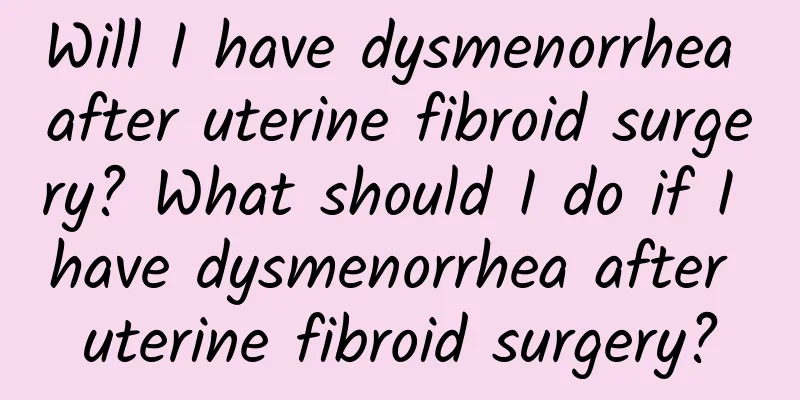Will I have dysmenorrhea after uterine fibroid surgery? What should I do if I have dysmenorrhea after uterine fibroid surgery?

|
Women experience pain in the abdomen and waist before, during, or after menstruation, or even severe pain, which comes with the menstrual cycle. This is called dysmenorrhea. So, will dysmenorrhea occur after uterine fibroid surgery? What are the symptoms of dysmenorrhea? Dysmenorrhea in women is caused by uterine contraction and menstrual blood discharge. It is normal to have mild abdominal pain. Keep warm during menstruation and avoid eating raw, cold and irritating foods. If the pain is severe, consider severe gynecological inflammation such as endometritis, adenomyosis, pelvic inflammatory disease, etc. Women do have dysmenorrhea after uterine fibroid surgery, which should not be ignored by patients. The symptoms of dysmenorrhea mainly start from a few hours before menstruation or vaginal bleeding, including abdominal pain, cold pain, burning pain, tingling pain, dull pain, falling pain, colic, spasmodic pain, and tearing pain. The pain extends to the sacral back and even involves the thighs and feet, and lasts for 1/2 to 2 hours. The pain site is mostly in the lower abdomen, and in severe cases it can radiate to the lumbosacral region or the anterior side of the inner thigh. About 50% of patients are accompanied by systemic symptoms: breast swelling and pain, anal swelling, chest tightness and irritability, sadness and irritability, panic and insomnia, headache and dizziness, nausea and vomiting, stomach pain and diarrhea, fatigue, pale complexion, cold limbs, cold sweat, collapse and fainting. After the onset of severe abdominal pain, it turns into moderate paroxysmal pain, which lasts for about 12 to 24 hours. It gradually disappears after the menstrual blood flows smoothly, and occasionally you need to stay in bed for 2 to 3 days. There are many drugs to choose from in the treatment of dysmenorrhea. The following are common ones with minimal side effects. Patients can choose to use them according to their own needs. Dysmenorrhea ointment: For external use, 2 to 3 times a day; apply an appropriate amount of ointment to the navel, then apply the patch; other affected areas can be directly applied. It can promote blood circulation and dispel cold, regulate menstruation and relieve pain. Nuan Gong Qiwei San: It has the effects of regulating menstruation and nourishing blood, warming the uterus and stopping leucorrhea. It is used for heart and kidney "He Yi" disease, qi stagnation and low back pain, cold pain in the lower abdomen, irregular menstruation, and excessive leucorrhea. Motherwort Granules: The main ingredient is motherwort; the auxiliary ingredients are sucrose and dextrin. Used to promote blood circulation and regulate menstruation. Used for scanty menstruation. |
Recommend
What are the five major hazards of uterine fibroids? What harm will uterine fibroids cause to the body?
What are the five major hazards of uterine fibroi...
What is painless abortion? How much do you know about it?
Nowadays, there are more and more advertisements ...
What to eat after menstruation to replenish qi and blood? These four types of food replenish qi and blood
Most Chinese women suffer from insufficient Qi an...
What are the symptoms of pelvic inflammatory disease?
In recent years, the number of patients with pelv...
What tests are needed for uterine endometriosis?
What tests are needed for endometriosis? 1. In ca...
Housewives must learn this! One trick to help you get pregnant and flatten your belly
The trend of late marriage is gradually gaining m...
How should women view the symptoms of cervicitis? Chronic cervicitis has five clinical manifestations
The cervical glands can secrete viscous secretion...
Summary of the causes of cervical precancerous lesions
In daily life, I believe that most patients do no...
Will uterine fibroids cause abdominal pain?
Will uterine fibroids cause abdominal pain? The p...
It’s not difficult to have a small waist! Experts share their secrets to slimming down your belly
If you want a flat belly, check what kind of fat ...
What tests should be done after the miscarriage? Should I be fasting?
Post-abortion check-up usually requires B-ultraso...
What should women pay attention to when eating during abortion? Women should pay attention to these 5 points when eating during abortion
Abortion is very harmful to women's health, w...
What is the effective treatment for dysmenorrhea?
What is the effective treatment for dysmenorrhea?...
Can I drink coconut water if I have ovarian cyst?
Patients with ovarian cysts can usually drink coc...
How to completely cure cervical warts
As we all know, cervical warts can cause great ha...









